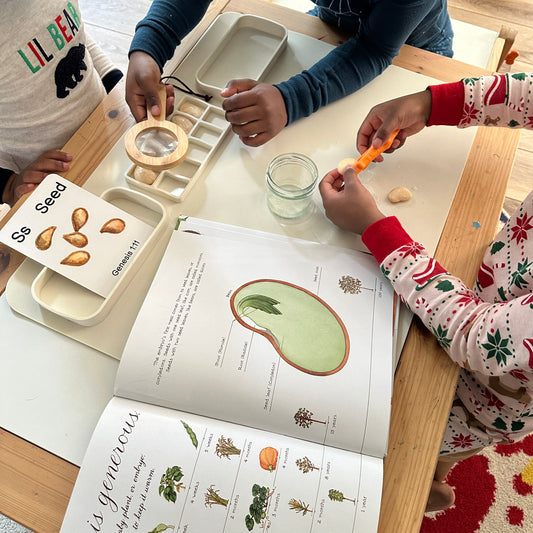
Early Bible Integration to Avoid Faltering Faith
Share
Here's the end from the beginning: We’re going to ensure our children aren’t the 1 of 3 young adults who start to doubt their belief in God.
I was floored by this statistic from the 2019 American Perspectives Survey:
“Only 30 percent of young adults (age 18 to 29) say they believe in God without ever questioning their belief. About one-third (32 percent) say they believe in God but have doubts.”
Higher education is often to blame for young people’s dissolved faith; but this same study cites that more than two-thirds of young adults who leave the religion they were raised in did so (at least emotionally) before age 18.
If we want to help our children forge unshakeable faith in God, we’ve got to show them, from the very beginning, that His Word is real, and it’s relevant.
By connecting the Bible with observations, experiments and other books as early as preschool, our children have a chance to see God’s Word at work in the world. When they can experience it for themselves, it grows their faith right along with their intellectual curiosity.
Unfortunately, children are becoming more accustomed to asking Google, Siri or Alexa than seeking God for knowledge, wisdom and understanding. And its no wonder.
“For the Lord gives wisdom; From His mouth come knowledge and understanding;” (Proverbs 2:6 NKJV)
As parents, we have to unlearn how we learned before we can give our kids the education we envision for them.
We might miss opportunities because of:
- Fixation on Kindergarten readiness and state learning standards that aren’t calibrated for your child’s ultimate, eternal success
- Dependence on scripted, “open and go” homeschool curriculum that doesn’t integrate Scripture across subjects
- Uncertainty about how to connect the Bible with less obvious subjects, like reading, math or art
- Fear that you don’t know enough about the Bible yourself
If you can relate to any of those worries, let me tell you: there is hope! Here's how you can start solidifying your little one’s faith and academic foundation, step by step:
Step 1: Spend time in the Word yourself, everyday.
This is essential, because our brains can’t make these spur of the teachable moment connections with information that isn’t there.
Listen to the Bible while you drive, walk the dog or wash dishes. If early morning quiet time is your thing, choose a Bible reading plan and spend some time reading and reflecting on a Bible passage each day. Journaling helps to solidify your own observations and connections, which makes it easier to bring those things to mind when something related happens.
Step 2: Don’t be afraid to say, “This reminds me of…” even if you can’t remember chapter and verse!
So many people go all deer-in-headlights here, because they’re afraid of butchering the quote or mixing up a few details from a Bible story. They freeze, the moment passes, and the opportunity to connect a regular life moment with life-giving Scripture is missed. Ever been there? I have!
To avoid this, just start describing whatever it is in the Bible that you’re reminded of as it relates to what’s happening right now. Meanwhile, jump into the Blue Letter Bible app and start searching for keywords from the verse or story. When you find it, read it!
If your kids are older and they’re asking you questions you don’t know the answers to off the top of your head, it’s totally ok to say that. But follow up with, “Let’s look it up together.”
Most important here is building those bridges between God’s Word and the real world. If they can see Scripture in action and application as children, they’ll believe it and prayerfully, build their lives on it as they grow older.
Step 3: Focus on building connection, with your child and with God.
You don’t need a theology degree or even a mapped out lesson plan with everything perfectly aligned. With little ones, foundational connections are what we’re after. Follow your child’s interests, listen to their questions and point out things you notice in everyday life. Share your observations. Invite your little one to explore how something they enjoy connects to a principle shared in the Bible (think: construction truck obsession meets the parable of the wise and foolish builder). Point out how characters in a story you’re reading demonstrate character traits mentioned in Scripture (like the Fruit of the Spirit)… or don’t.
In time, you’ll find that you’re both growing closer together and closer to God. You’re building a foundation together, one that will support all the years of academic, spiritual and personal learning and growth to come.



